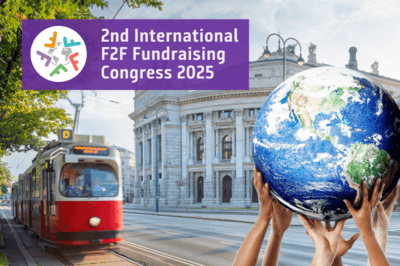
2024 in review – & a look forward at the year to come
January 15, 2025
Anthony Cotte: From pixels to purpose – how gaming fundraisers empower nonprofits
February 26, 2025Angela Norton, national manager of the Public Fundraising Regulatory Association in New Zealand and speaker at April’s International F2F Congress in Vienna, discusses the critical role of self-regulation for sustainable fundraising.
As fundraisers, earning and maintaining trust is essential to inspiring generosity. Without trust, donor confidence erodes, and charities struggle to fulfil their mission.
How can charities and agencies maintain public confidence while ensuring sustainable revenue streams in an era of heightened scrutiny, transparency, and evolving donor expectations? The answer lies in robust self-regulation.
To build and strengthen public trust, charities must actively listen to and respond to community feedback. Self-regulation in charity fundraising isn’t just about protecting donors – it’s about supporting and empowering them too. At the F2F Congress in Vienna, I will explore how ethical self-regulation frameworks, grounded in principles-based codes of conduct, safeguard donors and provide them with new ways to meaningfully engage with the causes they care about. This proactive approach fosters deeper connections between donors and charities while reinforcing trust and transparency in the process.
Self-regulation is more than just compliance – it’s a fundamental pillar of ethical, sustainable, effective and impactful fundraising. Here’s why.
The case for self-regulation
The fundraising sector is dynamic and diverse, spanning different markets, cultures, and regulatory environments. However, the common thread across all regions is the need for ethical fundraising that upholds public trust.
The Public Fundraising Regulatory Association New Zealand has supported and empowered members since 2006 by providing a proactive framework for self-regulation that ensures charities and fundraising agencies operate with integrity beyond just legal obligations.
By developing and adhering to self-regulatory frameworks, fundraising organisations can:
- Set clear ethical expectations to ensure fundraisers operate with integrity.
- Enhance transparency and accountability to donors, regulators, and the public.
- Proactively manage risks related to reputational damage or public scepticism.
- Strengthen industry credibility by demonstrating collective responsibility.
Principles-based codes of conduct: a flexible and ethical approach
A core component of effective self-regulation is the adoption of principles-based codes of conduct. These frameworks go beyond fixed rules to establish ethical standards that guide fundraisers in diverse and evolving circumstances.
Unlike prescriptive regulations, principles-based codes emphasise intent, impact and context, and support fundraisers to make decisions based on ethical considerations rather than just ticking compliance boxes. Key principles often include:
- Honesty – Ensuring truthful and clear communication with donors.
- Respect – Upholding donor rights and dignity at every interaction.
- Accountability – Being answerable for fundraising practices and outcomes.
- Transparency – Providing clear information on how funds are raised and used.
- Sustainability – Ensuring responsible fundraising that considers long-term impact.
Building and maintaining trust
Trust is the foundation of all successful fundraising. Without it, donor engagement diminishes, and the communities and beneficiaries we serve are directly impacted. Self-regulation fosters trust by setting high ethical standards and demonstrating a commitment to responsible and transparent fundraising.
Strategies for maintaining trust include:
- Open and honest communication – Donors should know how their contributions make an impact.
- Clear complaints and compliance mechanisms – Avenues for addressing concerns must be accessible and effective.
- Third-party accreditation and oversight – Independent reviews help reinforce credibility.
- Consistent ethical behaviour across all channels – Whether in face-to-face fundraising, telemarketing, or digital marketing, integrity must remain at the core.
Future-proofing fundraising: the role of self-regulation in long-term success
As fundraising landscapes evolve – whether due to technological advancements, economic shifts, or regulatory changes – self-regulation provides charities and agencies with the flexibility to adapt without compromising ethical integrity. By embedding these frameworks within their operations, organisations can not only navigate challenges with confidence and ethical clarity, but innovate responsibly while maintaining donor trust, and establish long-term sustainability through consistent ethical practices.

About the International F2F Fundraising Congress
Where: Vienna
When: 28-30 April 2025
EFA discount: Thanks to the support of additional social funding for the event, the F2F Congress host Fundraising Verband Austria is pleased to be able to offer a 20% discount on tickets to EFA members and Fundraising Europe readers, accessible with the code EFA20 when booking here.
More information: www.f2f-fundraising.com
Sessions at the F2F Congress on self-regulation include Angela Norton’s Building Trust & Sustainability: How Self-Regulation Strengthens & Future-Proofs Your Charity’s Fundraising, and Helping You Fundraise Sustainably, Ethically, and Effectively in Any Circumstance, co-presented with Matt Radford, which will delve into practical applications of the principles explored in the article, offering insights into how charities and agencies can embed ethical practices into their daily fundraising operations. View the full programme here, and read more in this month’s story.

About Angela Norton
With over a decade in charity fundraising, Angela Norton works to drive transformative self-regulation that is focused on supporter experience, ethics, transparency, and accountability. As national manager for the Public Fundraising Regulatory Association (PFRA), she collaborates with members to strengthen a self-regulatory framework that builds public trust and empowers support for valued causes.
Main picture by Vicki Hamilton on Pixabay




